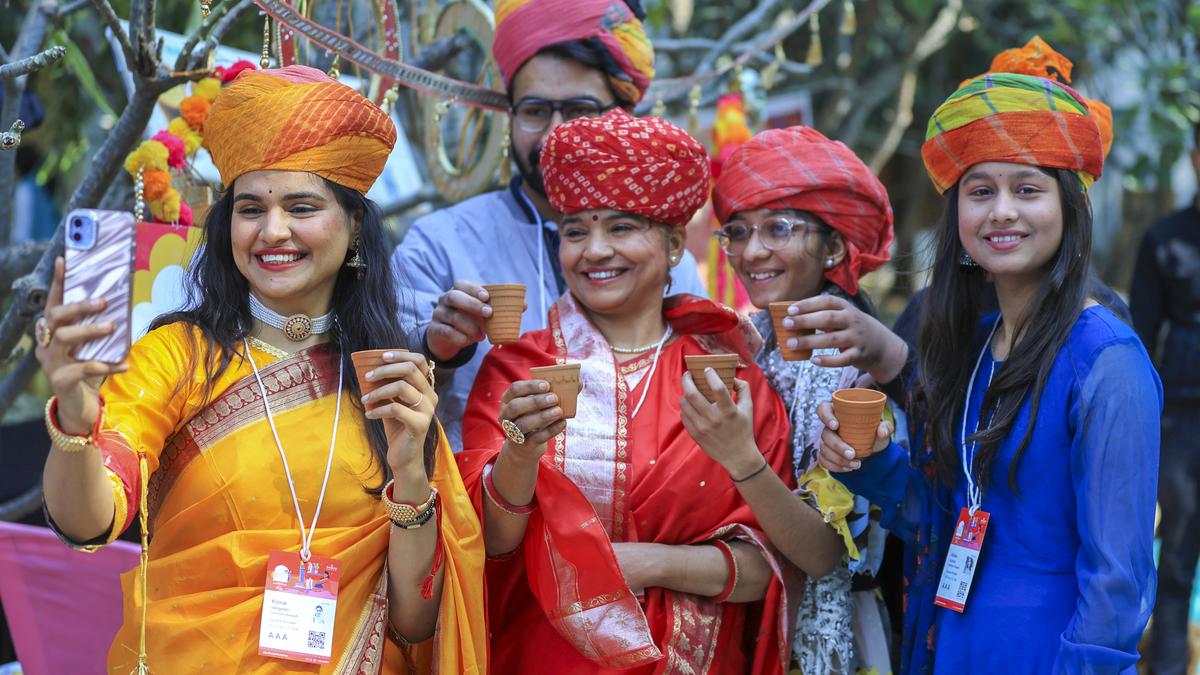
Notes from the Jaipur Literature Festival
The Hindu
Notes from the Jaipur Literature Festival, where major themes ranged from AI in publishing to the Israel-Palestine conflict, and stardom arrived with the Murthy-Sunak quartet
Every literature festival in India has its own flavour, culture and identity, but few rival the sheer size of the Jaipur Literature Festival or JLF, first held in 2006, and in that sense, the OG.
The Hindu’s Lit for Life in Chennai is awe-inspiring for how well-read and intellectual its audience is, and I am always intimidated to moderate a session with an author, knowing that most people in the audience have read the book we will discuss. The Bangalore Literature Festival is quintessential Bengaluru — civil citizenry at the fore, conversations that are chilled but candid all the same. The Khushwant Singh Literature Festival in Kasauli feels like a warm drawing room with a fire roaring nearby, where the audience knows one another, where the debate can get raucous but always ends on friendly terms.
But JLF is JLF — built on a massive scale with crowds so large that it is referred to as the “Mahakumbh of literature”, multiple stages and parties across the city, and celebrities so internationally renowned that it is both exhilarating and exhausting to navigate. According to JLF organisers, led by authors William Dalrymple and Namita Gokhale, as well as Sanjoy Roy, who runs one of India’s biggest production and event management companies, more than five million people and about 8,000 speakers have attended the festival in nearly 20 years.
One of the major themes this year is the use of Artificial Intelligence (AI) in publishing. While AI can replace some of the functions of writers and editors, it can’t replicate the sheer energy and chemistry of this sort of literary gathering, where authors and readers meet face-to-face. Controversy is a constant theme at the festival, although it is clear the organisers have considerably reduced the presence of politicians and ideologues at the event, given past experiences.
For a foreign policy buff, JLF always has a special corner of programming that brings together a range of diplomats based in India, former Indian diplomats as well as international journalists. This year, the overarching issue is Palestine and the Israel-Gaza conflict, with more than a dozen different panels discussing the issue directly or in the context of geopolitical turmoil or international rule of law, including writers such as Pankaj Mishra, Avi Shlaim, Selma Dabbagh, Philippe Sands, as well as foreign correspondents like Lindsey Hilsum, Gaith Abdel Ahmed, Yaroslav Trofimov and Edward Wong who have covered the conflict, and diplomats Kishore Mahbubani, Navtej Sarna, Vikas Swarup and Navdeep Suri who worked on policy around it. Even serving diplomats like the U.K. High Commissioner Lindy Cameron and Irish Ambassador Kevin Kelly speak about the issue, defending their government’s contrasting positions.
At the start of the festival, the organisers shut down an interview given by the Palestinian Charge d’affaires Abed El Razeg Abu Jazer at the JLF media centre, saying he is not an invited speaker, but a guest at the festival. Right-wingers rage on social media about the platforming of “woke” sentiments, but the crowds at the event seem clearly sympathetic of the Palestinian cause.
The showstopper is Gideon Levy, Haaretz columnist who doesn’t mince his words about Israel’s actions, the illegal occupation by settlers and bombardment of Gaza. If the future is not a two-State solution for Israel and Palestine, then there are only two options, he says: for Israel to be an ‘apartheid’ Zionist or discriminatory single state, with one population oppressing the other, or for it to be a single democratic state, which would bring its own strife. While we rightly celebrate journalists who put on their bulletproof vests to go cover conflicts around the world, there’s a special kind of courage that Israeli journalists like Levy demonstrate, by staying in their country and not censoring criticism of their government’s actions despite pressures and threats.













